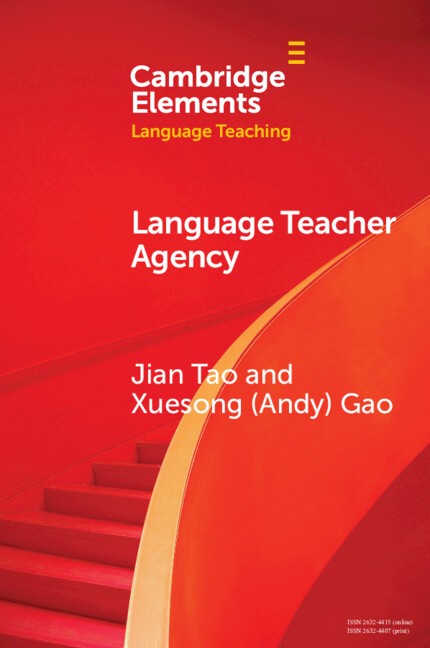Home >
Cambridge Elements in Language Teaching >
Language Teacher Agency (Paperback)
Cambridge Elements in Language Teaching
Language Teacher Agency (Paperback)
ISBN: 9781108932769
Series: Cambridge Elements in Language Teaching
Language Teacher Agency (Paperback)
Cambridge Elements in Language Teaching Language Teacher Agency (Paperback) Media > Books > Non-Fiction > Education Books Now available| Order Below |
ISBN
9781108932769 (10-digit ISBN: 1108932762)
- Description
- Series Description
This Element aims to elucidate the concept of language teacher agency by exploring the 'what' question, offering major conceptualisations of agency and explaining how they shape the way we approach teacher agency. The authors then continue with the 'why' question, and elaborate on the reasons that language teacher agency matters, based on a discussion of the varied purposes of teacher agency at multiple levels. They also acknowledge that teacher agency does not operate alone, and discuss how it intersects with such concepts as teacher identity, emotion, belief and knowledge. Based on this, they identify ways to promote teacher agency through making changes to contexts and/or actors. They then introduce the concept of collective agency and propose a multi-layered model based on an illustrative study. The Element ends with a call for a trans-perspective on understanding language teacher agency so as to facilitate the professional development of language teachers.
Language teaching as a field of study straddles the disciplines of education and applied linguistics (and at times other disciplines such as applied psychology and applied sociology). As societies have become increasingly mobile, language teaching practices have changed to keep pace with changing learners’ needs. Globalisation has led to dramatic changes in language pedagogies, both in terms of the rise of global lingua franca such as English, Spanish, Chinese, and Arabic, as well as issues surrounding language teaching in immigrant communities.
As language teaching has developed as a distinct academic field, some scholars have observed a widening gap between researchers and practitioners, accompanied by limited exposure to research by teachers, and a disconnect between professional and academic publications. This elements series aims to close this gap by allying research with language teaching practices, in its exploration of research-informed pedagogy, and pedagogy-informed research. The series builds upon a rich history of pedagogical research in its exploration of new insights within the field of language teaching.
As language teaching has developed as a distinct academic field, some scholars have observed a widening gap between researchers and practitioners, accompanied by limited exposure to research by teachers, and a disconnect between professional and academic publications. This elements series aims to close this gap by allying research with language teaching practices, in its exploration of research-informed pedagogy, and pedagogy-informed research. The series builds upon a rich history of pedagogical research in its exploration of new insights within the field of language teaching.
This Element aims to elucidate the concept of language teacher agency by exploring the 'what' question, offering major conceptualisations of agency and explaining how they shape the way we approach teacher agency. The authors then continue with the 'why' question, and elaborate on the reasons that language teacher agency matters, based on a discussion of the varied purposes of teacher agency at multiple levels. They also acknowledge that teacher agency does not operate alone, and discuss how it intersects with such concepts as teacher identity, emotion, belief and knowledge. Based on this, they identify ways to promote teacher agency through making changes to contexts and/or actors. They then introduce the concept of collective agency and propose a multi-layered model based on an illustrative study. The Element ends with a call for a trans-perspective on understanding language teacher agency so as to facilitate the professional development of language teachers.
As language teaching has developed as a distinct academic field, some scholars have observed a widening gap between researchers and practitioners, accompanied by limited exposure to research by teachers, and a disconnect between professional and academic publications. This elements series aims to close this gap by allying research with language teaching practices, in its exploration of research-informed pedagogy, and pedagogy-informed research. The series builds upon a rich history of pedagogical research in its exploration of new insights within the field of language teaching.
Series Description
Language teaching as a field of study straddles the disciplines of education and applied linguistics (and at times other disciplines such as applied psychology and applied sociology). As societies have become increasingly mobile, language teaching practices have changed to keep pace with changing learners’ needs. Globalisation has led to dramatic changes in language pedagogies, both in terms of the rise of global lingua franca such as English, Spanish, Chinese, and Arabic, as well as issues surrounding language teaching in immigrant communities.As language teaching has developed as a distinct academic field, some scholars have observed a widening gap between researchers and practitioners, accompanied by limited exposure to research by teachers, and a disconnect between professional and academic publications. This elements series aims to close this gap by allying research with language teaching practices, in its exploration of research-informed pedagogy, and pedagogy-informed research. The series builds upon a rich history of pedagogical research in its exploration of new insights within the field of language teaching.
EASY ORDER FORM
PRICES LISTED INCLUDE CONSUMPTION TAX
Price Before Tax:
¥3,630 ¥2,904 ∼ 20% OFF!


